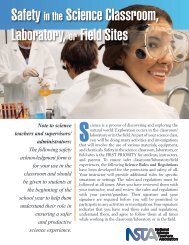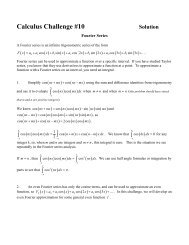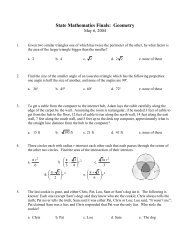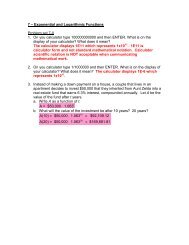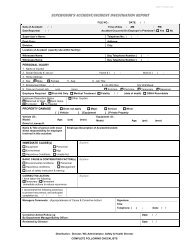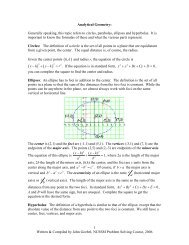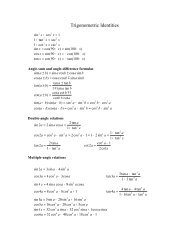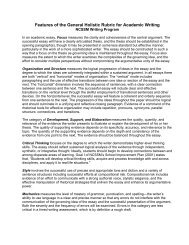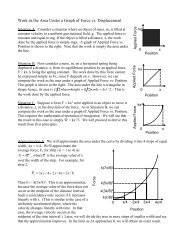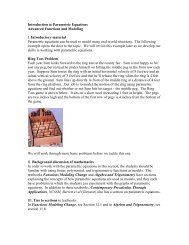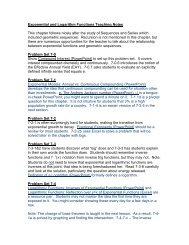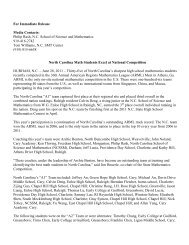NCSSM COURSE CAtAlOG - North Carolina School of Science and ...
NCSSM COURSE CAtAlOG - North Carolina School of Science and ...
NCSSM COURSE CAtAlOG - North Carolina School of Science and ...
You also want an ePaper? Increase the reach of your titles
YUMPU automatically turns print PDFs into web optimized ePapers that Google loves.
This course emphasizes the origin, structure, <strong>and</strong> evolution <strong>of</strong> massive stars <strong>and</strong><br />
the events that lead to supernovas, black holes, <strong>and</strong> neutron stars. The origin,<br />
structure, <strong>and</strong> evolution <strong>of</strong> galaxies <strong>and</strong> the universe are also studied in detail.<br />
Students are expected to integrate physics <strong>and</strong> chemistry principles into the<br />
study <strong>of</strong> both stellar <strong>and</strong> galactic structure <strong>and</strong> evolution. Opportunities for<br />
telescope observation <strong>and</strong> image processing projects are available.<br />
PH442 Research in Physics I<br />
One trimester<br />
Credit: One unit core elective credit.<br />
Prerequisite: B or higher earned in one trimester <strong>of</strong> core physics at <strong>NCSSM</strong>, or<br />
exemption from <strong>NCSSM</strong> core physics requirement; <strong>and</strong> permission <strong>of</strong> the Dean<br />
<strong>of</strong> <strong>Science</strong>.<br />
Meeting pattern: Eight periods per week including three labs<br />
This is an advanced course for students with the maturity, independence, <strong>and</strong><br />
motivation necessary to conduct their own research project. Students learn<br />
scientific methodology <strong>and</strong> experimental design before conducting a trial<br />
experiment on a small scale. Students may then be paired into research groups<br />
to write a research proposal on a problem <strong>of</strong> interest to them. Throughout the<br />
course, students read from the primary scientific literature <strong>and</strong> participate in<br />
discussion groups on current issues in scientific research. Based on the outcomes<br />
<strong>of</strong> the trimester’s work, students may be given an opportunity to participate in<br />
summer research programs on campus or in the Triangle area. Students with a<br />
final grade <strong>of</strong> B or higher are encouraged to continue in PH444 Research in<br />
Physics II.<br />
PH444 Research in Physics II<br />
One trimester<br />
Credit: One unit core elective credit.<br />
Prerequisite: Final grade <strong>of</strong> B or higher in PH442 Research in Physics I or<br />
successful participation in a summer research program; <strong>and</strong> permission <strong>of</strong> the<br />
Dean <strong>of</strong> <strong>Science</strong>.<br />
Meeting pattern: Eight periods per week including three labs.<br />
In this course, students continue to gather <strong>and</strong> analyze experimental data<br />
based on their previous trimester <strong>and</strong>/or summer work. Time is devoted to the<br />
completion <strong>of</strong> the research project <strong>and</strong> a written paper. Students are required<br />
to present their results at the <strong>NCSSM</strong> Research Symposium <strong>and</strong> are encouraged<br />
to present their research at the <strong>North</strong> <strong>Carolina</strong> Student Academy <strong>of</strong> <strong>Science</strong><br />
competition <strong>and</strong> other state <strong>and</strong> national competitions.<br />
79



